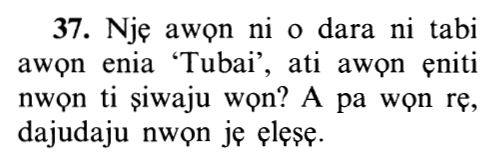44vs37
Select any filter and click on Go! to see results
أَهُمْ خَيْرٌ أَمْ قَوْمُ تُبَّعٍ وَالَّذِينَ مِن قَبْلِهِمْ أَهْلَكْنَاهُمْ إِنَّهُمْ كَانُوا مُجْرِمِينَ
Ahum khayrun am qawmu tubbaAAin waallatheena min qablihim ahlaknahum innahum kanoo mujrimeena
Index Terms
Click to play
Yoruba Translation

Hausa Translation
shin, sũ ne mafĩfĩta kõ kuwa mutãnen Tubba´u, kuma da waɗanda ke a gabãninsu? Mun halaka su, lalle sũ, sun kasance mãsu laifi.
Asbabu n-Nuzuul (Occasions of Revelation)
أَهُمْ خَيْرٌ أَمْ قَوْمُ تُبَّعٍ وَالَّذِينَ مِن قَبْلِهِمْ أَهْلَكْنَاهُمْ إِنَّهُمْ كَانُوا مُجْرِمِينَ ﴿٣٧﴾
Are they better or the people of Tubba` and those before them? We destroyed them because they were indeed criminals.
Then Allah threatens them and warns them of the irresistible torment other idolators like who denied the resurrection, suffered. Such as the people of Tubba`, i.e., Saba'. Allah destroyed them, wreaked havoc upon their land and scattered them here and there throughout the land, as we have already seen in Surah Saba'.
This was brought about because the idolators denied the Resurrection. Here too, the idolaters are compared to them.
They Tubba` were Arab descendants of Qahtan, just as these people (Quraysh) were Arab descendants of `Adnan. Among the people of Himyar -- who are also known as Saba' -- when a man became their king, they called him Tubba`, just as the title Chosroes was given to the king of Persia, Caesar to the king of the Romans, Fir`awn to the disbelieving ruler of Egypt, Negus to the king of Ethiopia, and so on among other nations.
But it so happened that one of the Tubba` left Yemen and went on a journey of conquest until he reached Samarqand, expanding his kingdom and domain. He is the one who founded Al-Hirah. It is agreed that he passed through Al-Madinah during the days of Jahiliyyah. He fought its inhabitants but they resisted him; they fought him by day and supplied him with food by night, so he felt ashamed before them and refrained from harming them.
He was accompanied by two Jewish rabbis who advised him and told him that he would never prevail over this city, for it would be the place to which a Prophet would migrate towards the end of time. So he retreated and took them (the two rabbis) with him to Yemen.
When he passed by Makkah, he wanted to destroy the Ka`bah, but they told him not to do that either. They told him about the significance of this House, that it had been built by Ibrahim Al-Khalil, peace be upon him, and that it would become of great importance through that Prophet who would be sent towards the end of time. So he respected it, performed Tawaf around it, and covered it with a fine cloth. Then he returned to Yemen and invited its people to follow the religion of guidance along with him.
At that time, the religion of Musa, peace be upon him, was the religion followed by those who were guided, before the coming of the Messiah, peace be upon him. So the people of Yemen accepted the religion of guidance along with him.
Abdur-Razzaq recorded that Abu Hurayrah, may Allah be pleased with him, said,
"The Messenger of Allah said:
مَا أَدْرِي تُبَّعٌ نَبِيًّا كَانَ، أَمْ غَيْرَ نَبِي
I do not know whether Tubba` was a Prophet or not."
It was narrated that Tamim bin Abdur-Rahman said:
" `Ata' bin Abi Rabah said, `Do not revile Tubba`, for the Messenger of Allah forbade reviling him.'''
And Allah knows best.
I'raab - grammatical analysis of the Qur'an
«أَ هُمْ» الهمزة حرف استفهام إنكاري و«هُمْ» مبتدأ «خَيْرٌ» خبر والجملة مستأنفة «أَمْ» حرف عطف «قَوْمُ» معطوف على الضمير «تُبَّعٍ» مضاف إليه «وَ الَّذِينَ» معطوف على قوم «مِنْ قَبْلِهِمْ» متعلقان بمحذوف صلة الموصول «أَهْلَكْناهُمْ» ماض وفاعله ومفعوله والجملة حالية «إِنَّهُمْ» إن واسمها «كانُوا» كان واسمها «مُجْرِمِينَ» خبرها والجملة الفعلية خبر إن والجملة الاسمية تعليل
